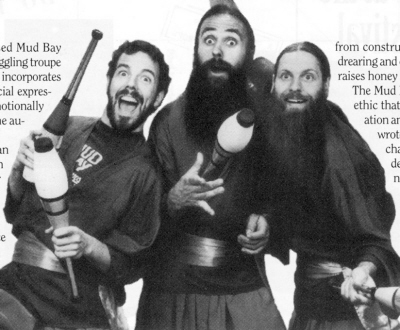
(l-r) Mark Jensen, Alan Fitzhum, Doug Martin |
Page 16 Winter 1991 - 92
Martin
and Jensen joined forces with Fitzthum and Gorski at a circus in
1982 to benefit the Nisqually
Valley Delta Association to save the valley from being developed
into a supertanker port. Over the years, their juggling act has been
everything from a hobby to a full time job. In earlier days they
performed in a variety of fairs and festivals. In 1987 and 1988 they
worked the college circuit, following a sometimes grueling schedule,
racking up thousands of miles on their van, crisscrossing the
country from campus to campus.
Since
then their pace has slowed a little. Jensen left for several years
to pursue a Ph.D. in clinical psychology in Arizona. He returned to
the Northwest in the fall of 1988 and has since joined the faculty
of the University of Washington in Seattle. A few months later,
Gorski left to pursue a career as a pilot first in the Midwest, then
in Connecticut and California for regional air carriers.
Both Martin and Fitzthum, more immune to "careerist pressures," still retain the classic "Mud Bay look." They have long, flowing hair, drawn back in ponytails and thick, patriarchal beards that frame ageless faces rich in character and warmth, with deep-set, sparkling eyes. Both are jack-of-aIl-tradesmen, whose skills run the gamut from construction and mechanics to childrearing and organic farming. Fitzthum also raises honey bees.
|

(l-r) Mark Jensen, Alan Fitzhum, Doug Martin |